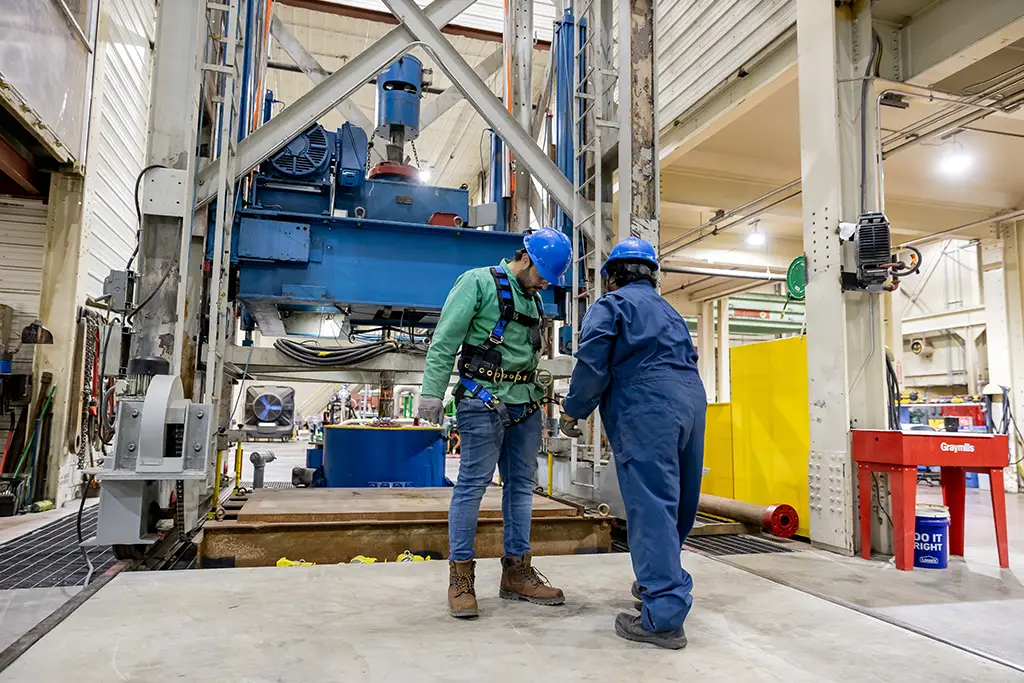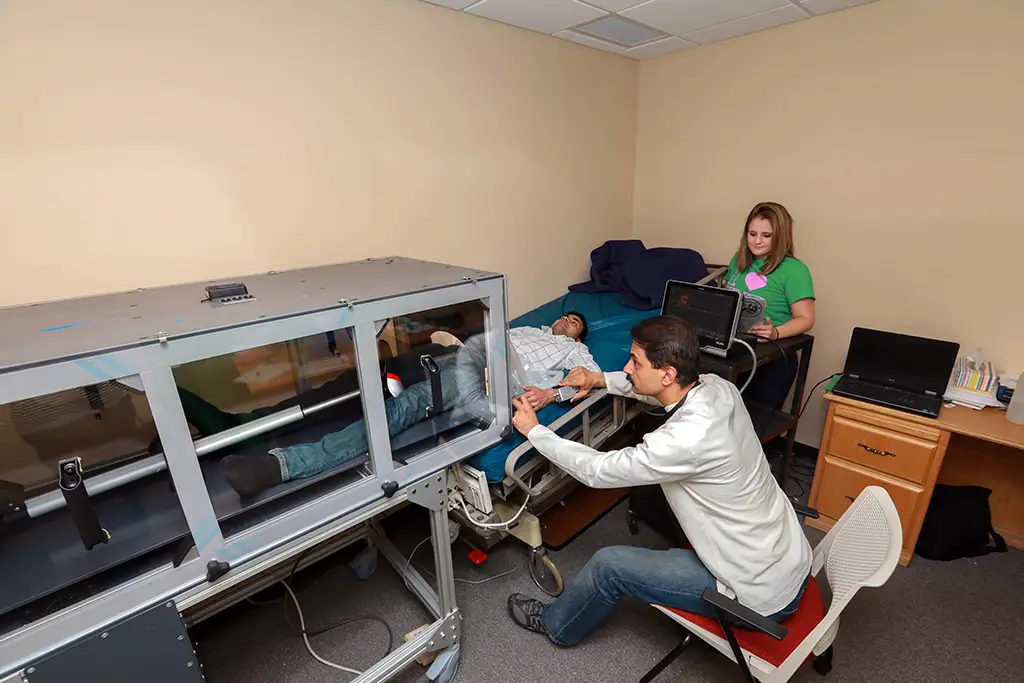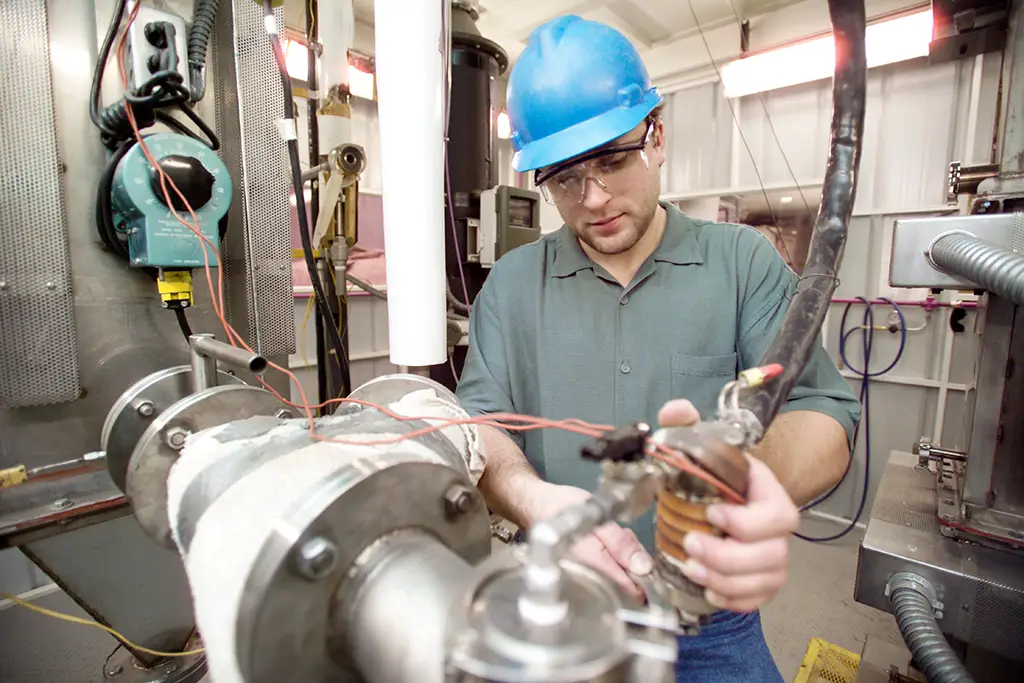
10 Best Engineering Degrees for Success and Growth
Engineering continues to shape the way we live, work, and move through the world.
Request Information
Whether it’s developing sustainable energy systems, designing life-saving medical devices, or building the next generation of AI, engineering continues to evolve across major industries.
With nearly 195,000 engineering positions projected to become available each year by 2033, demand is expected to continue increasing. But with so many specializations, how do we know which engineering degrees offer the strongest combination of growth and long-term success?
Here are ten of the best engineering degrees that stand out for their job prospects and impact on the world.
Key Takeaways
- Engineering remains a high-demand field with nearly 195,000 job openings projected each year through 2033.
- The best engineering degrees offer strong salary potential, long-term career growth, and the opportunity to solve significant global challenges.
- Choosing the right degree depends on aligning your skills and interests with one of the following fields: aerospace, cybersecurity, biomedical, or environmental engineering.
Best Engineering Degrees
Some engineering degrees rank among the best due to their strong job prospects, high salaries, and relevance to future-focused careers. These include aerospace, petroleum, mechanical, civil, chemical, biomedical, cybersecurity, electrical, geological, and environmental engineering.
These fields offer strong salary potential, high demand, and real-world impact across various industries. Factors such as job growth, technological relevance, and the ability to address global challenges make these degrees more attractive to aspiring engineers.
Aerospace Engineering
Aerospace engineering is the field that designs, develops, tests, and produces aircraft, spacecraft, satellites, and missiles.

At the University of North Dakota (UND), the Bachelor of Science in Aerospace Engineering covers aerodynamics, propulsion, fluid mechanics, computational fluid dynamics, satellite development, and more. It focuses on practical lab time and team-based projects from the beginning to equip students with the necessary skills.
Graduates pursue roles such as aerospace systems engineers, propulsion engineers, flight test engineers, guidance, navigation, and control specialists, and satellite designers. Many of them find opportunities in aerospace manufacturers like Boeing, Lockheed Martin, Collins Aerospace, NASA, or satellite companies.
An aerospace engineer earns approximately $134,830 annually, with a projected employment growth rate of 6% by 2033, resulting in 4,200 job openings each year. Industry trends such as sustainable aviation, small satellites, and drone proliferation are also among the most demanding trends in aerospace.
Petroleum Engineering
Petroleum engineering includes the exploration, extraction, and production of oil and gas resources from underground reservoirs.

The BS in Petroleum Engineering at UND is designed with direct input from industry professionals. The program covers reservoir engineering, drilling technology, fluid mechanics, and oil recovery techniques through drilling simulations and lab work.
Graduates are well-prepared for careers as drilling engineers, production engineers, reservoir analysts, or field engineers. Many students form strong connections through the program with major companies like Chevron, Halliburton, and ConocoPhillips.
Petroleum engineers earn around $141,280 per year, making the field one of the most lucrative in engineering. Innovations such as carbon capture and geothermal drilling further expand the sustainability roles in the field.
Mechanical Engineering
Mechanical engineering is one of the most widely applied fields, focused on designing, manufacturing, and maintaining mechanical systems. It’s an essential part of nearly every major industry, including transportation, robotics, energy, and healthcare.

At UND, the BS in Mechanical Engineering provides students with a comprehensive education in thermodynamics, fluid dynamics, materials science, manufacturing processes, control systems, and design. It’s structured around CAD modeling, senior design projects, and lab work with real-life engineering challenges.
Graduates find roles as mechanical design engineers, automotive engineers, robotics specialists, or HVAC system designers. Companies include global manufacturers, aerospace firms, and renewable energy companies. Mechanical engineers earn a median annual salary of $102,320 with a projected growth rate of 11% by 2033.
Civil Engineering
Civil engineering is one of the most important fields of engineering. It focuses on designing, constructing, and maintaining infrastructure like roads, bridges, buildings, water systems, and transportation networks. It creates safe and functional environments for society.

Students of the BS in Civil Engineering program at UND gain hands-on experience through labs, surveying courses, and senior design projects. They study subjects such as structural analysis, transportation engineering, environmental systems, geotechnical design, and construction materials.
Graduates are prepared for jobs like structural engineers, transportation planners, geotechnical consultants, or construction project managers. They typically work in government agencies, private construction companies, or environmental consulting firms.
Civil engineers earn an annual salary of $99,590, with a projected job growth rate of 6% by 2033. The demand for this occupation is expected to grow due to efforts to rebuild aging infrastructure and invest in sustainable urban development.
Chemical Engineering
Chemical engineering applies principles of chemistry, physics, and biology to develop processes that turn raw materials into fuels, pharmaceuticals, and plastics.

A BS in Chemical Engineering provides courses like reaction engineering, thermodynamics, process control, fluid mechanics, and sustainable energy systems. The curriculum focuses on process simulation tools and practical lab work that prepares students for highly technical settings.
Graduates can find job opportunities in process engineering, quality control analysis, pharmaceutical engineering, or chemical plant operations. They are equipped with the knowledge needed to work in various industries, including energy, biotechnology, food production, and environmental remediation.
Chemical engineers earn a median salary of $121,860 with a projected job growth rate of 8% by 2032. They continue to be in high demand due to their focus on green technology and clean manufacturing.
Biomedical Engineering
Biomedical engineering combines engineering principles with biology and medicine to design medical devices, imaging systems, and diagnostics.

The BS in Biomedical Engineering program at UND offers a comprehensive curriculum that encompasses biomechanics, biomaterials, medical imaging, bioinformatics, neuroengineering, and medical IoT devices. The curriculum blends innovation-based labs and capstone design projects to build students’ product development skills.
Graduates often become biomedical instrumentation specialists, medical device engineers, clinical engineers, or research and development (R&D) professionals in the medical technology (medtech) or healthcare industries.
Biomedical engineers earn approximately $106,950 each year, with 1,400 new job openings each year.
Cybersecurity Engineering
Cybersecurity engineering focuses on securing digital systems, networks, and data from cyber threats.

The BS in Cybersecurity Engineering program is designated by the NSA as a Center of Academic Excellence both online and on campus. It teaches secure system design, cryptography, network defense, and risk management.
Graduates can become cybersecurity engineers, network security architects, ethical hackers, or incident response analysts. Their workplaces include government agencies, defense contractors, or major tech firms.
The median salary for information security analysts, including cybersecurity engineers, is $124,910 per year, with a projected 33% growth by 2033.
Electrical Engineering
Electrical engineering includes the study of electricity, electronics, and electromagnetism for applications in power systems, communications, control systems, and electronics.

UND offers programs like the BS in Electrical Engineering, where students can train in engineering economy and lab work for circuit design, signal processing, power systems, electromagnetics, and embedded systems.
Graduates can work as power systems engineers, electronics designers, control systems engineers, or telecommunications experts. These roles can include industries like aerospace, automotive, and manufacturing.
Electrical engineers earn an annual salary of $110,910 with a projected employment rate of 9% by 2033. These roles are in high demand due to the growth in smart grids, IoT, and electrification trends.
Geological Engineering
Geological engineering integrates engineering with earth sciences to design and construct structures that interact with the Earth, manage natural resources, and apply engineering principles to geological issues.

Geology, geophysics, hydrology, and geo-mechanical engineering are among the most prominent courses offered in the BS in Geological Engineering program at UND. Students aspire to become geological engineers by focusing on fieldwork and lab-based subsurface analysis during their studies.
Graduates pursue roles as geological or mining engineers, environmental geotechnical consultants, or energy resource analysts. These positions usually include mining, oil and gas, environmental, and governmental sectors.
A geological engineer earns a median annual wage of $101,020, with around 400 job openings projected each year.
Environmental Engineering
Environmental engineering combines engineering and ecological principles to protect human health and the environment. It focuses on designing water and air pollution control systems, managing waste, and ensuring ecosystem sustainability.

UND offers an online Environmental Engineering certificate that focuses on environmental regulations, sustainability practices, and pollution control technologies. With flexible learning options and partnerships with agencies like the EPA, students gradually build their post-graduate future careers.
Graduates work as environmental consultants, water resources managers, air quality engineers, or sustainability coordinators. Their work environment includes government agencies, non-profit organizations, or utility companies.
With a median salary of $104,170, this industry is expected to have approximately 3,000 openings annually. The urgent need for climate change mitigation steadily increases the demand for environmental engineers.
Tips for Success in Engineering Education
Succeeding in engineering education demands more than just attending lectures and completing assignments; it takes dedication and hard work. Whether you’re a current student or starting to explore engineering as a future career, engaging in your academic journey can change your life.
At UND, this journey starts by building strong math and science skills that form the foundation for every engineering discipline. Courses in calculus, physics, and chemistry stand at the core of most programs. Mastering each course early on can help you feel more confident and prepared for what lies ahead.
UND also emphasizes real-world experience through internships and co-op programs. These opportunities provide students with the chance to apply theoretical knowledge in real-life situations, gain industry exposure, and establish a professional network before graduation.
Outside the classroom, UND encourages students to join engineering clubs, student organizations, or team-based competitions. These activities develop teamwork, creativity, and leadership skills through real-life engineering projects.
Academic support is another key part of UND. Tutoring centers, faculty office hours, and study groups are some of the most beneficial resources during demanding semesters. Learning how to manage your time, prioritize tasks, and break down large projects can help you feel less stressed and more productive.
Since engineers rarely work alone, UND helps students build strong communication and collaboration skills. Being able to articulate your ideas, listen to others, and collaborate with others can set you apart in school and future careers.
Choose the Best Engineering Degree For You
Choosing the best engineering degree is a crucial decision that can shape your future career and personal fulfillment. It’s essential to align your strengths, passions, and career goals with the specific demands and opportunities each discipline offers to make the right choice.
Start by reflecting on your natural abilities and interests. For example, do you enjoy working with computers and software, or are you more interested in designing structures? Are you drawn to solving environmental challenges, or do you find developing new medical technologies more exciting? Understanding what inspires you will help narrow down the options.
Ask yourself key questions like:
- What subjects do I excel in: math, physics, chemistry, biology, or computer science?
- What kind of work environment do I want to be part of? Laboratories, offices, outdoors, or industrial settings?
- Do I prefer to work independently or as part of a team?
- What are my long-term career goals? Do I want to lead projects, conduct research, or work in industry?
For example, if you have strong skills in math and physics and enjoy working with machines, mechanical engineering may be the right career for you. If you’re passionate about protecting the environment and solving sustainable problems, environmental engineering could be your path.
If you enjoy coding and cybersecurity, a degree in cybersecurity or software engineering may be a suitable fit for you. The best engineering degree matches your academic strengths and aligns with your personal interests or professional ambitions.
Conclusion
Engineering offers various degrees that lead to an exciting and rewarding career. Whether you want to design innovative products, protect the environment, advance technology, or improve healthcare, each engineering career can align with your strengths and interests.
Choosing the right degree is a significant step that deserves careful consideration and reflection. Take the time to research different careers, ask questions, and consider how each aligns with your skills and interests.
To start your journey, explore all engineering programs at UND, connect with experts in the field, and visit the campus career services for guidance and support.
FAQs
Petroleum engineering ranks among the top with mid-career salaries ranging from $130,000 to $200,000, while aerospace engineering and electrical engineering also offer strong salaries, ranging from $110,910 to $134,830. Of course, it varies by location, industry, and management or technical roles.
Cybersecurity engineering currently has the highest demand due to the increasing need for digital protection across all industries, with 514,359 jobs opening nationally in 2025.
The best engineering fields for entrepreneurs include those that drive innovation, like robotics, renewable energy, and biomedical engineering.
The rise of AI-driven workflows, smart manufacturing (also known as Industry 4.0), cloud-based design, and skill-based hiring is reshaping the future of engineering roles and the required expertise.